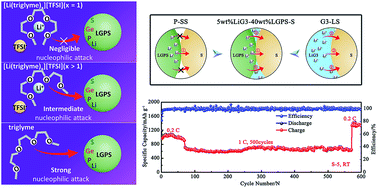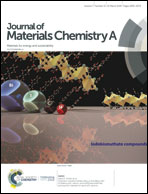A quasi-solid-state Li–S battery with high energy density, superior stability and safety†
Abstract
Lithium–sulfur batteries based on a solid-state sulfide electrolyte show great promise in achieving the next generation of rechargeable chemical power sources with high energy density and long lifespans. However, the poor solid–solid contacts within the electrode and at the electrode/electrolyte interface, as well as lithium dendrite formation and its interaction with sulfide electrolytes during cycling, are significant challenges that must be overcome before the full potential of sulfide electrolyte-based lithium–sulfur batteries can be realized. Here, we propose a [Li(triglyme)]+[TFSI]− (LiG3) solvent-salt complex with an excellent stabilizing effect towards Li10GeP2S12 electrolyte and demonstrate its application in a high-performance solid-state lithium–sulfur battery. A small quantity of LiG3 added into the cathode material dramatically enhanced the Li+ ion transfer and facilitated the transition from a solid–solid redox reaction involving sulfur species to a solid–liquid dual-phase redox reaction. Simultaneously, we achieved a stabilized solid electrolyte interphase layer at the lithium anode side by the in situ electrochemical reduction of LiG3 complex. The solid-state lithium–sulfur cells demonstrated high specific capacities of 1100 mA h g−1 at 0.2C and 650 mA h g−1 at 1.0C. Furthermore, pouch cells with dimensions of 4 × 5 cm2 were successfully fabricated, indicating the promising practical application of these cells in energy storage.



 Please wait while we load your content...
Please wait while we load your content...